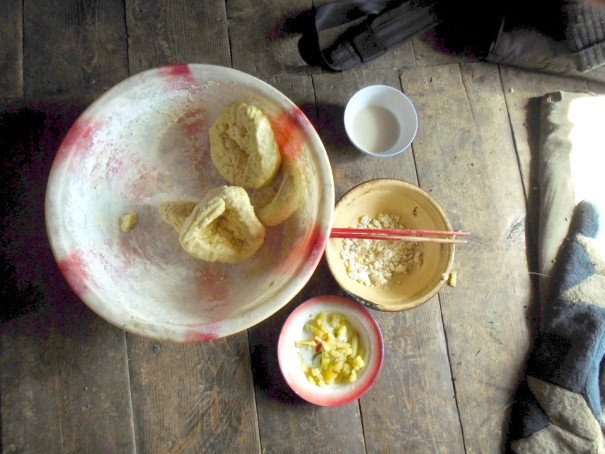
Yak

Yak
Everything Yak
Everything in this house is yak. I’ve got yak wool socks on my feet and a yak hair matt on the floor under my ass. There are bowls and leather sacks of yak milk in various stages of fermentation and spindles of yak yarn in the corners. The walls are made precious, rare wood, but from the outside I’ve seen that they’re studded with a fix-it mortar of yak dung patties. And I believe the same is being used to stoke the fires in the little cook stove beside me.
The greatest concentration of yakitude in the room, though, is probably the hearty breakfast before me: soft yak-milk bread, baked with a divot in the center of the roll for a dollop of rich, yellow yak butter to drop and melt in. This in turn is mashed in one’s hand into a greasy paste, and smooshed around a helping of granular yak cheese, soft with a taste somewhere between ricotta and Parmesan. To the side, there’s a bowl of finger sliced potatoes, which would be a nice variation if they hadn’t been slathered and fried golden in dripping gobs of yak butter themselves. And to top it all off, once I finish my bread, my hosts pour steaming yak butter tea, a thick mixture with a heavy tang and saltiness, into the bowl, the remnants of bread and butter bobbing up little globs and oily droplets at the surface.
I didn’t seek this spread out in some fit of Epic Meal Time machismo. This is pretty much par for the course for the nomadic family I’m visiting in their winter hut outside of Lhagang (Tagong), a grasslands town and nexus point for yak herding Tibetans in the Garzê (Ganzi) prefecture of China’s Sichuan province. Although we’re not in the Tibetan Autonomous Region, Garzê is part of the Tibetan plateau and home to the Khampa Tibetan peoples, traditionally itinerant herders with a penchant for large, gilded knives and guerilla warfare. Some folks in Rongzhang (Danba), towards the TAR, farm wheat and potatoes. But Lhagang’s all-patchy scrub grass and boggy mud clots at an elevation of 12,000 feet. It’s plugged into wider China—there’s even an electrical wire running up to the house—but despite the AM radio and blow dryer off in a corner, in most aspects of day-to-day life, including a culinary reliance on yak, the Khampa nomads are relatively tuned out. But no one’s complaining.
This is something I’ve noticed when crossing paths with nomads from Kyrgyzstan to Mongolia. No matter how the local economy takes off, and no matter what new foods go on the shelves, the basic diet remains one of meat and dairy overload. Not that their diets don’t change and evolve or that many I’ve met don’t relish a good Snickers bar. But in the grand scheme of things, there’s still quite a bit of flesh about. It’s enough to put a self-avowed Western urbanite meat enthusiast like myself to shame.
But it also gets me thinking about diet and nutrition and the ends to which humans can be stretched and conditioned. It gets me thinking: Why will I almost certainly sweat rivulets of grease and get the meat shakes tonight, while everyone else here will get on just fine? Why do I hear so much about the merits of a vegetarian or fruitarian diet, and the deadliness of milk, and then meet so many nomads who, despite being wind-burnt and battered, are as strong as whatever they herd into old age? Why does my doctor always preach variety, but experience tells me that one of the healthiest diets is usually whale blubber and rotted seal meat?
Maybe I put myself in these situations and ask myself these questions because I want to justify my low-veg, meat lover’s diet. Maybe it’s just comforting for me to think that you can build a civilization on yak feasts. I like the idea of a world where people seem to get by without food pyramids. My body’s a frail, little modern city thing. But it makes me feel sturdier by proxy to know that the Khampa eat like this and thrive. And it gives me the smug, self-righteous satisfaction that maybe all the health nuts out there don’t know much more than I do—because they don’t know that with the right upbringing, we could all get by in a world of infinite yak.